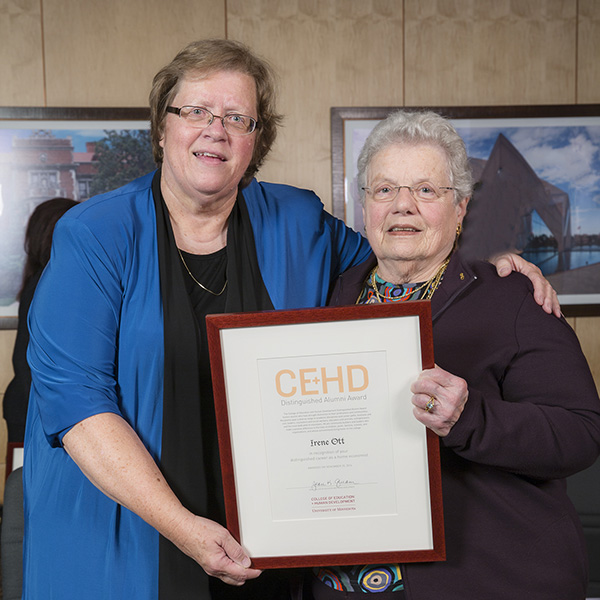Recognizing our donors
Recognizing donors is an important way for the college to express its deep gratitude and show supporters how their generosity helps to foster excellence and the drive to discover.
The President's Club
The President's Club recognizes individuals, families, and organizations whose University-wide cumulative giving totals of $100,000 or more.
The Heritage Society
Donors who make planned gift commitments, such as including the University in their will or trust, or naming the U as a beneficiary of a life insurance policy or retirement plan accounts, make a generous promise to future generations and become a part of the Heritage Society.
This is why I give

In Irene Ott’s hometown of Albert Lea, 4-H was a vital part of the community, and her participation laid the foundation for a 30-year career in university outreach programs.
Ott enrolled in the College of Home Economics to pursue her dream of becoming an extension agent. (Home Economics later became the College of Human Ecology, a predecessor of the Department of Family Social Science in CEHD.) Unfortunately, a family health crisis forced her to leave school for a period. “My adviser gave me courage to decide to put my education on hold,” she says. “I remember how much she helped me through that situation.”
After three years of caring for her family and working, Ott was able to return to the U and complete her bachelor’s and master’s degrees. She then worked in Martin and McLeod Counties as a home economist, teaching practical skills and sharing the university’s expertise with homemakers and 4-H groups.
Ott realized that in order to advance, she needed more urban experience, and got a job in Genesee County, Michigan. There, she focused on parent education and worked with a much more diverse population. Eventually she joined Michigan State University and became the first female district supervisor, managing extension personnel and programs in 11 counties. Some of the “crusty old timer ag agents” thought they could test Ott by inviting her to visit their farms and get her hands dirty—“as if I’d never been to one,” she recalls with a laugh. In 1980, she moved back to Minnesota and worked as a program leader and state director, retiring six years later. She was recognized in 2014 with a CEHD Distinguished Alumni Award.
Ott’s university and professional affiliations introduced her to students from all over the world. She noticed international students often needed additional financial assistance to go to professional conferences, hire writing tutors, and other needs. Taking advantage of a matching program, she established the Irene M. Ott International Fellowship in Family Social Science. “Travel is the best education you can get, and I wanted to support graduate students who are coming to Minnesota from their home country.” At age 92, Ott says she still keeps up with the field, and appreciates the strong leadership and forward-looking faculty in CEHD.
—ANN DINGMAN